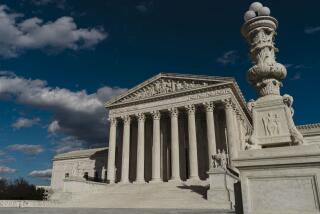Ruling Puts New Controls on Anti-Whistle-Blower Actions
- Share via
WASHINGTON — Corporations may not buy the silence of whistle-blowers and prevent their giving damaging testimony against the company in other states, the Supreme Court ruled Tuesday.
The 9-0 decision strips auto makers, tobacco firms and other companies of what once seemed a promising means for them to keep damaging internal information from jurors. If a nondisclosure agreement approved by a judge in one state could be used to block a whistle-blower’s testimony in another state, embattled companies could limit the effects of disgruntled former employees.
But the Supreme Court rejected that reasoning Tuesday, ruling that the U.S. Constitution does not authorize one state court “to control proceedings . . . in other states.”
The ruling clears the way for a new trial against General Motors Corp. over the death of a 29-year-old woman in the fiery crash of Chevrolet sport-utility vehicle. GM was sued on behalf of the woman’s two young sons.
The original trial, before a jury in Kansas City, Mo., resulted in a $11.3-million verdict against GM. The trial included testimony from a former GM engineer who said a faulty fuel pump fed the fire that killed Beverly Garner. Rather than shutting off after the crash, the fuel pump continued to feed gasoline into the fire, he said.
The engineer, Ronald Elwell, had already proved to be an expensive threat to GM. He worked for the company for nearly 30 years and analyzed crashes involving trouble-prone vehicles. For a time, he even testified as an in-house expert for the company.
In 1987, however, Elwell quit, reportedly angered over his treatment by the company. His testimony later in a Georgia case involving a pickup truck fire led to a whopping $105-million verdict against GM in 1991.
Seeking to prevent any more such damage, GM obtained a court order in Michigan directing Elwell not to testify in any future case involving GM. That order became a permanent injunction in 1992 after GM and Elwell agreed on an undisclosed settlement.
Despite the order, Elwell has been subpoenaed to testify in dozens of other trials around the nation. Although he has not been accused of disclosing corporate secrets, GM maintained that his testimony in the Kansas City trial was a violation of the Michigan court order.
The Supreme Court disagreed. “Michigan’s power does not reach into a Missouri courtroom,” said Justice Ruth Bader Ginsburg for the court.







